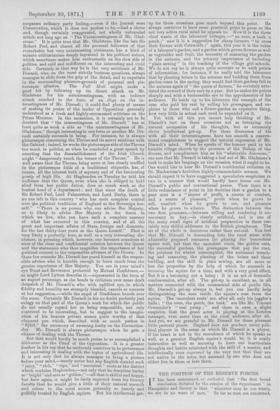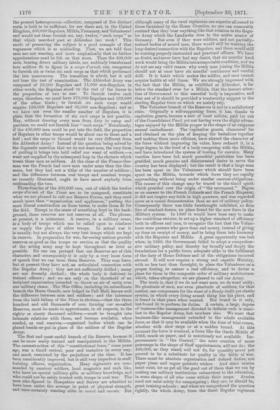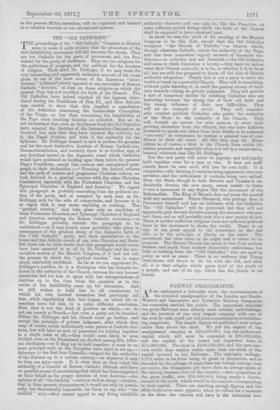THE POSITION OF THE RESERVE FORCES.
I T has been announced, ex cathedra, that " the first broad 1 conclusion dictated by the results of the crxperiment " in Hampshire and Surrey is that " whatever may be our wants, we are in no want of men." So far as men are concerned, the present heterogeneous collection, composed of five distinct sorts, is held to be sufficient, for are there not, in the United Kingdom, 400,000 Regulars, Militi a,Yeoman ry, and Volunteers? and would not these furnish six, nay, twelve, " such corps " as that which marched past at Aldershot last week ? This mode of presenting the subject is a good example of that vagueness which is so misleading. First, we are told that men are not wanting, and more emphatically that no farther apprehensions need be felt on that score. Then the 400,000 men, bearing divers military labels, are suddenly transformed into soldiers fit to figure in a corps d'armie, nay, competent to furnish six or twice six such corps as that which performed the late manoeuvres. The transition is adroit, but it will not bear the test of examination. The Aldershot Army was composed of 23,000 Regulars and 11,000 non-Regulars, in other words, the Regulars stood to the rest of the forces in the proportion of two to one. To furnish twelve such corps, therefore, we must have 276,000 Regulars and 132,000 of the other kinds ; to furnish six such corps would require 188,000 Regulars and 66,000 non-Regulars ; and as we have not even the smaller number of Regulars, it is plain that the formation of six such corps is not possible. Nay, without drawing every man from duty in camp and garrison, we could not furnish four "such corps." Notoriously, if the 400,000 men could be put into the field, the proportion of Regulars to other troops would be about one to three and a half ; and the corps so formed would be very different from the Aldershot Army I Instead of the question being solved by the dogmatic assertion that we do not want men, the very form of putting it brings into bold relief our want of soldiers,—a want not supplied by the subsequent leap in the rhetoric which treats these men as soldiers. At the close of the Franco-Ger- man war the French had more men under arms than the Ger- mans, but they had not a tithe of the number of soldiers ; and the difference between real troops and nominal troops, so recently illustrated, ought to have saved anybody from confounding the two.
Three-fourths of the 400,000 men, out of which the twelve corps d'arnule of the Times are to be composed, constitute what we are pleased to call our Reserve Forces, and they need much more than " organization and appliances," putting the most liberal construction on these terms, to make them fit for the field. Except in the sense of something kept in the back- ground, these reserves are not reserves at all. The phrase, at present, is a misnomer. A reserve, in a military sense, is a body of troops which can be called upon to reinforce or supply the place of other troops. In actual war it is usually, but not always, the very best troops which are kept in reserve. In preparation for war, far-seeing nations provide reserves as good as the troops on service, so that the quality of the acting army may be kept throughout as level as possible. No one can pretend that our Reserves are of this character, and consequently it is only by a very loose form of speech that we can term them Reserves. They may have, but at present they have not, an articulated connection with the Regular Army ; they are not sufficiently drilled ; many are not decently clothed; the whole body is deficient in trained officers ; and we are only on the threshold of an incipient organization intended to throw an air of unity over our military chaos. The War Office, including its subordinate branch the Horse Guards, now lodged in Pall Mall, knows well the difference between men and soldiers ; and the inference from the bold fallacy of the Times is obvious,—that the three hundred and odd thousands of men, forming our so-called Reserves, must bo made to approximate, in all respects, to the eighty or ninety thousand soldiers,—must be brought into intimate relations with them, and become available, when needed, as real reserves,--organized bodies which can be placed beside or put in place of the soldiers of the Regular Army.
The first and most useful branch of the Reserve, because it can be more easily trained and manipulated, is the Militia. The reconstruction of this " constitutional force," some years ago, was a timid revival, poor and tentative in every way, and much restricted by the prejudices of the time. It has been considerably improved, but is still very imperfect in staff, training, officers, organization. Many regiments are com- manded by amateur soldiers, local magnates and such like, who have no special military gifts or military knowledge, and who could not be safely trusted with troops in real war. The men who figured in Hampshire and Surrey are admitted to have boon under the average in point of physical strength, and were certainly wanting alike in moral and morale. But
although many of the rural regiments are superior all round to those furnished by the Home Counties, no one can reasonably contend that they bear anything like that relation to the Regu- lar Army which the Landwehr does to the active armies of Germany. But even if they were soldiers, and not partially- trained bodies of armed men, there would still be wanting the long-desired connection with the Regulars, and there would still be wanting properly-instructed and practised officers. We have no doubt, andnever have had any doubt, that six months' hard work would bring the Militia into arespectable condition, and we do not see any valid reason why every man joining the Militia. should not at once have six months' continuous and careful drill. It is habit which makes the soldier, and men cannot. acquire habits at odd times. We are strongly impressed with the fact that the Militia, as exhibited at Aldershot, is far below the standard even for a Militia, that the instant atten- tion of Government to this essential body is imperative, and that out of it should be provided a trustworthy support to the sterling Regular force on which we mainly rely.
The Volunteer branch of the Reserves is ,not in a satisfactory state. Originally a self-supporting force, it has, thanks to• capitation grants, become a sort of local militia, paid for out of the Consolidated Fund, yet not having even the slight advan- tages enjoyed by the Militia proper in the shape of an exiguous annual embodiment. The capitation grants, clamoured for and obtained on the plea of keeping the battalions together and making them more efficient, have altered the character of the force without improving its value, have reduced it, in a large degree, to the level of a body competing with the Militia,, and have introduced the system of touting for recruits. Many vanities have been fed, much parochial patriotism has been gratified, much genuine and disinterested desire to serve the country has been displayed ; but the result is that a largo sum has been spent on the Volunteers which should have been, spent on the Militia, towards which force they are rapidly approaching without being under similar onerous obligations.. The causes of this change may be traced to the timid spirit which presided over the origin of " the movement." Begun. as an answer to the French Colonels and the French Emperor; it did not inspire any faith in high quarters, and was regarded more as a moral demonstration than an act of military policy. Consequently there was little forethought exhibited, no firm: line of conduct drawn, no place found for the new force in the Military system. In 1860 it would have been easy to make the conditions stricter, to set up a higher standard of efficiency both in officers and men, to recognize the fact that the Volun- teers were persons who gave time and money, instead of giving up time on receipt of money, and to bring them into harmony with the Regulars and Militia. A great opportunity was lost. when, in 1860, the Government failed to adopt a comprehen- sive military policy, and thereby lay broadly and deeply the foundations for a public force, adequate alike to the fulfilment. of the duty of Home Defence and of the obligations incurred. abroad. It will now require a strong and capable Ministry, with no less tact than foresight, to place the Volunteers on a. proper footing, to ensure a real efficiency, and to devise a. place for them in the composite order of military architecture which, taken altogether, we are pleased to call our Army.
The truth is, that if we do not want men, we do want unity.. No plenitude of men, nor even plenitude of soldiers, for that. matter, can compensate for the want of a firmly-built yet elastic system, in which every living armed thing has his place, and is found in that place when wanted. Nor found in it only, but found fit to perform its duties. A certain, a large, degree, of business-like management directed to definite ends is mani- fest in the Regular Army, but nowhere else. We want that business-like management extended to the whole available, force, so that it may be available when the time of trial comes, whether with slow steps or at a sudden bound. At this, moment the force is nominal, a force like the Garde Mobile of 1868, much on paper, and is notoriously not available. Im- provements in " the Control," the mere creation of more• patronage in the shape of Staff appointments, will not do ; the 400,000, as they stand, will not do, for quantity never yet proved to be a substitute for quality in the fields of war. There must be absolute organization and defined duties, not paper plans and vague patriotic wishes. And since armies, must exist, let us get all the good out of them that we can by making our military institutions subservient to the education, in some shape, of all who come within their scope. Armies need not exist solely for campaigning ; they are, or should be, great training-schools ; and when we comprehend the question, rightly, the whole Army, from the finest Regular regiment.
to the poorest Militia battalion, will be regarded and treated as a valuable fraction of our educational system.
































 Previous page
Previous page